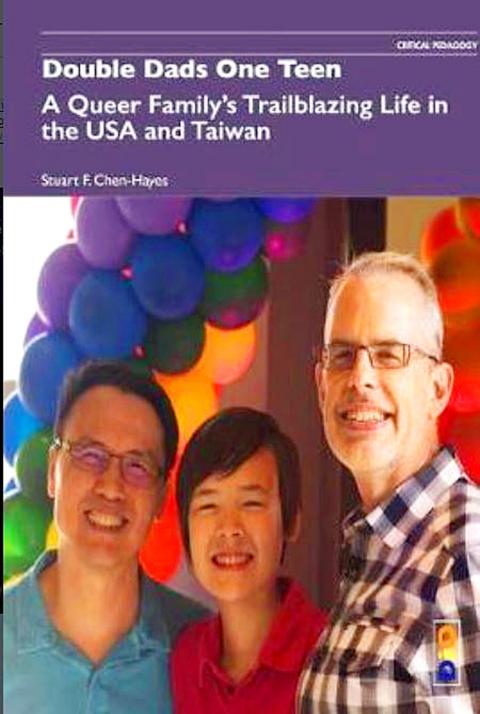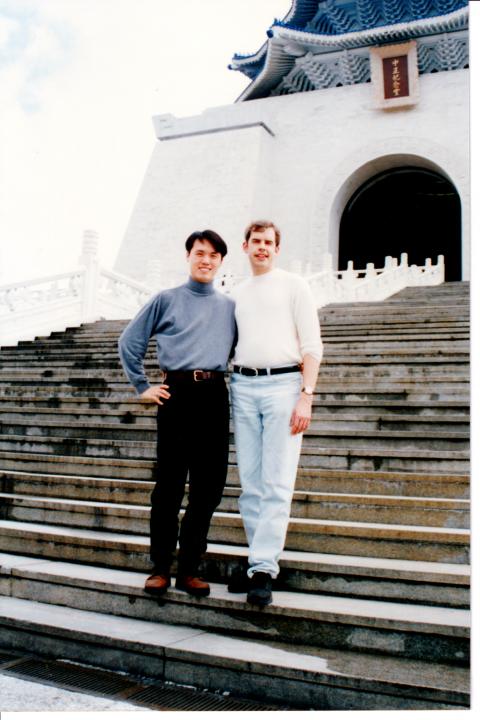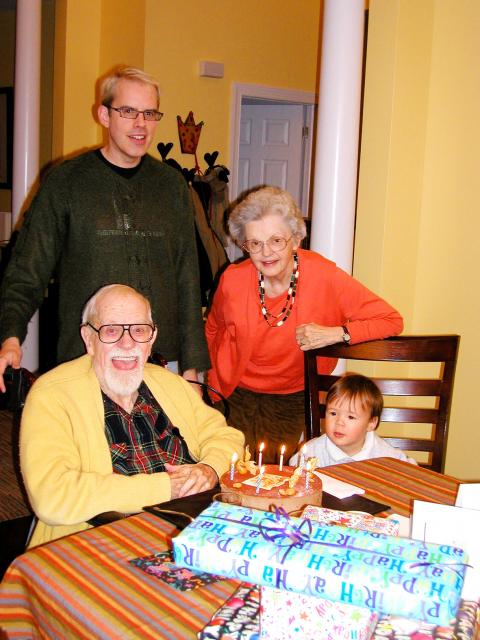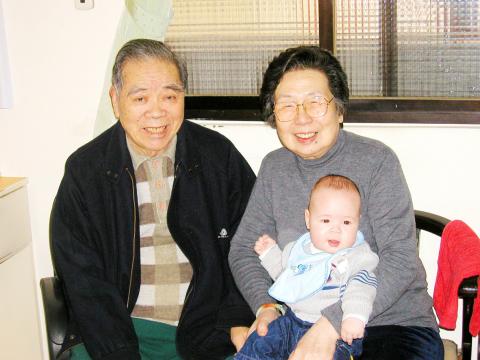“Who can stop us from celebrating?” That’s the axiom by which Lance and Stuart Chen-Hayes have lived, loved and parented as a gay couple for almost 20 years. Their journey is recounted with warmth and vigor in this new memoir.
Author Stuart Chen-Hayes is a professor of counselor education at Lehman College, City University of New York married to Taichung-born Lance Chen-Hayes (陳子良), a retired doctoral-level physical therapist. The couple are currently based in Pennsylvania, where their only child, Kalani Chen-Hayes (陳愷樂), is in high school.
Despite the Chen-Hayes’ academic pedigree and the book’s publication under the critical pedagogy series of New York-based DIO Press, the memoir uses a conversational tone and is filled with scenes and reflections from the couple’s own lives.

This makes the book not only a seamless, affable read — almost like chatting to the Chen-Hayes over coffee — but also an instructive example of how we can bear out abstract political and pedagogical convictions in lived experience.
Chapters are divided into milestones and periods in the Chen-Hayes’ lives, from the couple’s first date in Chicago in 1995 until the present.
The Chen-Hayes first confirmed their union with an exuberant commitment ceremony, which they call their “‘illegal’ wedding,” in July 1997. They augmented this with domestic partnerships and civil unions in the different US states where they lived over the years, until they were able to marry legally in New York in 2012.

Photo courtesy of Stuart and Lance Chen-Hayes
The most moving arc in their story happens early on and revolves around the Chen-Hayes’ siblings and parents. Lance’s process of coming out in adulthood first to his siblings (in a 24-page letter) and then mother is told in Stuart’s words, but retains the emotional potency of baring the truest version of yourself to your loved ones.
There’s a piercing resonance in the indirect way through which Lance’s parents ascertain the nature of their son’s relationship with Stuart, whom they first meet when the couple visit Taichung as “friends,” and later when Lance’s parents visit Chicago and stay at the couple’s home.
Real-life lines of dialogue immortalized in this portion of the book strike me as not being out of place in the screenplay for a film like The Wedding Banquet (喜宴), Ang Lee’s (李安) 1993 romantic comedy-cum-family drama about a mixed-race gay couple.

Photo courtesy of Stuart and Lance Chen-Hayes
Stuart’s sister Alison, who volunteers to be the surrogate when the Chen-Hayes decide to have a child, also cuts a memorable figure. Descriptions of her and other members of the Chen-Hayes’ “families of origin and family of choice” — the latter describing friends, teachers, colleagues and other sources of community — bear witness to the saying that it takes a village to raise a child.
That child is Kalani, who blossoms in the second half of the book as a courageous, articulate and sensitive youth activist. This is where the Chen-Hayes’ critical pedagogy becomes most evident, as Stuart describes the pains that they take to ensure their child grows up fluent in their own unique mix of cultural, ethnic and racial heritage.
Key to this parenting philosophy is the use of rituals to maintain and strengthen the family. This is in no way a concession by the author that two gay fathers do not make a real family. Rather, it’s in keeping with the queer sensibility that we choose and create our families as much as we are born into them.

Photo courtesy of Stuart and Lance Chen-Hayes
The Chen-Hayes’ rituals for Kalani range from the ordinary — home-cooked dinners every day — to the extraordinary, culminating in a “First Gay Teen Day” coming-of-age ceremony on Kalani’s 13th birthday that brought together loved ones to celebrate them. (Kalani identifies as queer, pansexual and non-binary, and uses the pronouns “they” and “them.”)
Stuart describes himself with Lance as an “out-of-the-closet, gay, mixed-race, dual-national, bilingual couple.” Standing at the intersection of many marginalized identities, the Chen-Hayes are fierce protectors of equality for themselves and others like them. This book serves as a chronicle of their activism, including the growth of LGBTQ activism in Taiwan from the mid-1990s, up to and including Lance’s activism for the national referendum concerning LGBTQ issues last November.
That Taiwanese angle will be made more prominent in the Chinese-language version of the book, authored by Lance and slated for release here next year. I look forward to reading more about Lance’s perspective on growing up gay in Taiwan, and how this society has progressed in protecting LGBTQ rights and equality.
Double Dads One Teen references several LGBTQ-sensitive pop culture products, including The Wedding Banquet, but also age-appropriate television shows, books and magazines that the Chen-Hayes shared with Kalani, serving as a reminder of the importance of diverse and inclusive cultural representation.
There is little doubt in my mind that this book itself is a welcome entry to that canon of literature for LGBTQ families.

June 2 to June 8 Taiwan’s woodcutters believe that if they see even one speck of red in their cooked rice, no matter how small, an accident is going to happen. Peng Chin-tian (彭錦田) swears that this has proven to be true at every stop during his decades-long career in the logging industry. Along with mining, timber harvesting was once considered the most dangerous profession in Taiwan. Not only were mishaps common during all stages of processing, it was difficult to transport the injured to get medical treatment. Many died during the arduous journey. Peng recounts some of his accidents in

“Why does Taiwan identity decline?”a group of researchers lead by University of Nevada political scientist Austin Wang (王宏恩) asked in a recent paper. After all, it is not difficult to explain the rise in Taiwanese identity after the early 1990s. But no model predicted its decline during the 2016-2018 period, they say. After testing various alternative explanations, Wang et al argue that the fall-off in Taiwanese identity during that period is related to voter hedging based on the performance of the Democratic Progressive Party (DPP). Since the DPP is perceived as the guardian of Taiwan identity, when it performs well,

The Taiwan People’s Party (TPP) on May 18 held a rally in Taichung to mark the anniversary of President William Lai’s (賴清德) inauguration on May 20. The title of the rally could be loosely translated to “May 18 recall fraudulent goods” (518退貨ㄌㄨㄚˋ!). Unlike in English, where the terms are the same, “recall” (退貨) in this context refers to product recalls due to damaged, defective or fraudulent merchandise, not the political recalls (罷免) currently dominating the headlines. I attended the rally to determine if the impression was correct that the TPP under party Chairman Huang Kuo-Chang (黃國昌) had little of a

At Computex 2025, Nvidia CEO Jensen Huang (黃仁勳) urged the government to subsidize AI. “All schools in Taiwan must integrate AI into their curricula,” he declared. A few months earlier, he said, “If I were a student today, I’d immediately start using tools like ChatGPT, Gemini Pro and Grok to learn, write and accelerate my thinking.” Huang sees the AI-bullet train leaving the station. And as one of its drivers, he’s worried about youth not getting on board — bad for their careers, and bad for his workforce. As a semiconductor supply-chain powerhouse and AI hub wannabe, Taiwan is seeing